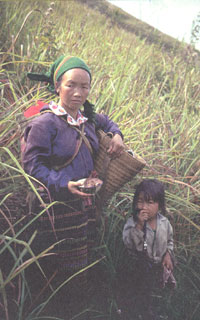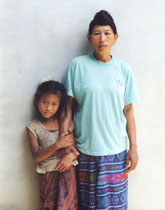| Background | |
| Hmong | |
| Khmu | |
| Yao | |
| Lahu | |
| Akha | |
| Stories | |
| Schedule | |
| Sponsorship | |
| Contact | |
| The development challenge in Laos | |||
| Staying true to tradition while adapting to change | |||
| Situated at the centre of the Mekong Quadrangle,
the people of Laos, sheltered from the effects of globalisation until
the early 1990s, are now finding themselves confronted with the many
changes that open borders bring. |
|||
 Construction
is in process on all weather roads that will give villagers better
access to towns and government services; traders are importing useful
products and offering farmers opportunities to export their produce,
and electricity is already bringing information from other areas of
Laos and from abroad via radio and television to some areas. Construction
is in process on all weather roads that will give villagers better
access to towns and government services; traders are importing useful
products and offering farmers opportunities to export their produce,
and electricity is already bringing information from other areas of
Laos and from abroad via radio and television to some areas. |
|||
| Potential negative impacts of development | |||
| Development could potentially have many negative effects on life in rural areas, however. With the increase in economic opportunities and cultural demands, the risk is that individuals, particularly youth will turn to stimulants such as amphetamines, presented to them by dealers as a 'modernising drug” to step up their speed and energy. The new roads also bring business opportunities of a dubious nature and some girls and women may be drawn into prostitution without adequate knowledge of how to protect themselves. Farmers don’t always know how to negotiate with new business partners and may end up with a poor share of the deal and the loss of control of local resources. Some young people are tempted to leave Laos in the search of work in neighbouring countries such as Thailand, where without work permits or the support of their family and friends, they may face exploitation. | |||
| Act on stage and then in real life | |||
| In order to minimise the negative impact of development
on the local life and culture in rural areas, people need new coping
strategies to deal with change. In the case of preventing HIV/AIDS,
drug abuse and human trafficking, access to information can save lives.
Theatre is as an effective method of awareness raising on such issues and can therefore play a key role in community education and development. Theatre is a non confrontational way of addressing problems. It makes talking about sensitive, and even normally taboo subjects such as prostitution, possible. After a performance, people can discuss the actions of the people in the play instead of criticising individual members of their village. They can test potential ways of problem solving on stage in front of the whole village and then discuss them. Daring to take action within the playful situation of a theatre play, villagers realise that they have just performed an action they could also undertake in real life. |
|||
| Hill tribe theatre - keeping traditional Lao culture alive | |||
| Laos has around 70 different hill tribes, often speaking
their own language. Many of them however share some aspects of a common
lifestyle. They are all farmers living in village communities, with
the family as the most important social unit and the relationship
between the human and the spirit world of significance. |
|||

|
|||
|
Theatre for Development work helps to keep the wealth of traditional culture in Laos alive. Village audiences are thrilled to hear songs and see dances from the past brought by the actors to the heart of their villages. While the rural population is adapting to modern life and deciding how to process the many new influences; traditional stories, songs and dances are a source of joy and are an important reminder of their Lao cultural identity. The theatre teams who are very familiar with the traditions of individual ethnic minorities can make effective presentations from their own experience, which cause strong audience identification with the message. Theatre is a new phenomenon in rural areas of Laos. But storytelling in the form of music and dance has always been a strong part of Lao culture, so it comes naturally to the people there to perform in front of an audience. Now villagers are discovering how exciting and useful it can be to create their own form of music theatre. |
|||
|
|||
| Working method | |||
| By interviewing and organising training workshops
for themselves run by government experts, and getting advice and support
from donor organisations, theatre team members collect all available
information on the chosen theme. They also collect local knowledge
by talking to fellow villages, families and friends. Then they create
lively plays based on these stories and experiences and on factual
knowledge from the experts. These plays are performed in village market
places with the participation of the whole village and with local
government officials and create a public forum for discussion. After
such events, villagers should be in a better position to make informed
choices to the benefit of their health and standard of living. Since forming in March 2004, the teams have performed in 37 villages for over 16 thousand people on the subjects of drug abuse, HIV/AIDS, microfinance and agriculture. |
|||
| Gender equality | |||
 Theatre
is a practical way of promoting equality for women. On stage, in dialogue
with husbands, fathers, brothers, bosses and male colleagues, women
act out their everyday experiences and express their views. They can
show the role they play now and the one they would like to play. They
can show the community how much they can achieve when given the chance. Theatre
is a practical way of promoting equality for women. On stage, in dialogue
with husbands, fathers, brothers, bosses and male colleagues, women
act out their everyday experiences and express their views. They can
show the role they play now and the one they would like to play. They
can show the community how much they can achieve when given the chance. |
|||